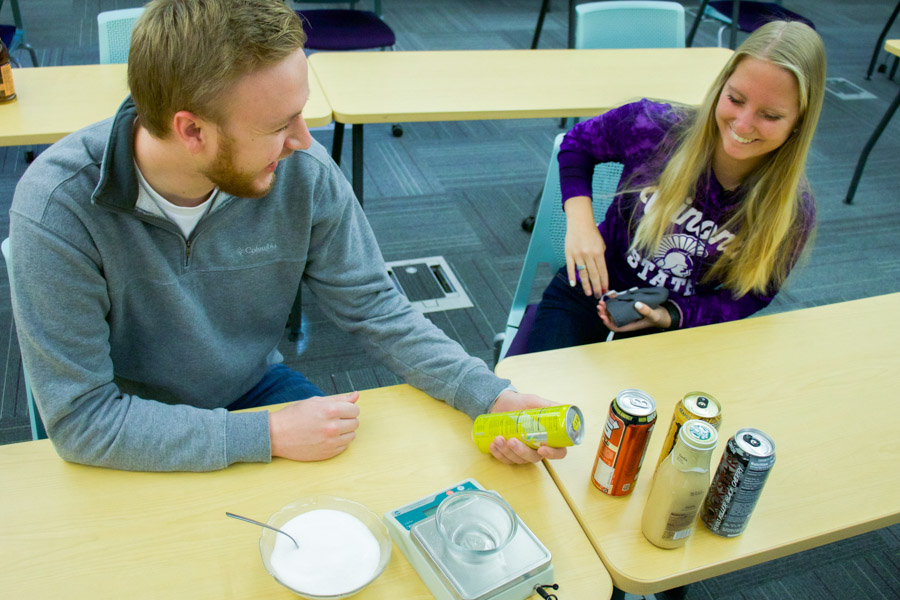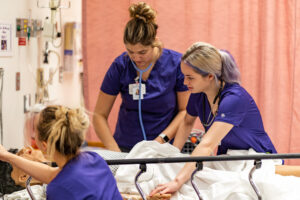
Public Health: Nutrition
Bachelor's
PROGRAM SNAPSHOT
Influence the factors that shape people’s food choices and diets. Understand the art and science of maintaining and promoting the health of populations around the world.
Many factors influence the food choices we make every day. Those choices affect the long-term health and wellness of our entire population.
Public health nutrition professionals advocate for safe food systems, sustainability, and equitable food access for all—especially marginalized groups.
With an undergraduate background in public health nutrition, you can achieve careers that promote healthy habits for individuals and support food systems within communities. You’ll also be prepared to pursue graduate education and advanced training and become a Registered Dietitian/Nutritionist (RDN).
Plus, you’ll hone your skills in the field with more than 600 hours of practicum and internship experience.
Winona State is the only public university in Minnesota that offers a bachelor’s degree program in Public Health: Nutrition.
This major is available through WSU’s Department of Health, Exercise and Rehabilitative Sciences (HERS).
As a Public Health: Nutrition major, you’ll gain a foundational understanding in nutrition science.
You’ll also:
- explore how cultural and spiritual beliefs impact dietary habits.
- prepare staple food dishes from our regional and global neighbors.
- learn how nutritional needs and challenges vary across the lifespan.
- design and implement a project that enhances your community’s nutritional health.
You’ll complete advanced coursework in digestion and metabolism, nutrient function, disease prevention and management, and even diet analysis.
Your classes will prepare you for careers in health education and promotion, healthy community development, public health research, and program planning.
Aside from major- or minor-specific requirements, you’ll need to complete additional requirements through the General Education Program (GEP) to earn your degree from Winona State University.
Learn More about the GEP
In the Classroom
Throughout this program, you’ll create projects and presentations to address current and emerging food and nutrition trends and issues in our world.
You’ll design, plate, and present a meal that meets the U.S. Department of Agriculture National School Lunch Program nutrition requirements.
You’ll also give a presentation that relates a country’s health care beliefs and practices to its dining practices and food economy.
During an upper-division nutrition course, you’ll partner with a health clinic, long-term care facility, school, or other organization in the community.
You’ll assess the nutrition education needs of their population, design a program, then implement and evaluate its impact.
You could find yourself organizing a nutrition-themed health fair for community members, teaching nutrition curriculum to local middle school students, or designing nutrition-based programs and activities for an after-school program.
Get the real-world preparation you need on top of your degree.
Winona State offers students access to First Aid and CPR certification through the American Red Cross.
You can earn Mental Health First Aid certification through the National Alliance on Mental Illness (NAMI) to recognize early signs or symptoms that someone with a mental health challenge may have and refer them to the right support services.
You can earn your bachelor’s degree in Public Health: Nutrition from WSU and your Master of Public Health (MPH) from St. Ambrose University in only 5 years with the 3+2 path.
During your final undergraduate year, you’ll earn credits that count toward both degrees.
This saves you time and money and makes you a competitive job candidate.
Be one step closer to becoming a nutritionist or dietitian with personalized advising.
To take the Registered Dietitian/Nutritionist (RND) credentialing exam, you must meet extra academic and internship requirements.
If you want to pursue further education geared toward completing these requirements, Public Health advisors will help you identify graduate programs in nutrition or dietetics that match your goals.
Beyond Campus
As a Public Health: Nutrition major, you’ll complete a 600-hour hands-on internship before you graduate.
One student in the inaugural cohort of this program is interning as a Spiritual Ecologist at a religious congregation in La Crosse, WI.
This field experience will give you supervised practice with a variety of populations and dietary needs.
In addition to your practicum, you’ll complete more than 60 practical hours at various public health agencies in the community.
Your practicum allows you to job shadow and develop a variety of health education and promotion programs based on community members’ needs.
Public Health: Nutrition students have completed their practicums with Bridges Health, Winona Area Public Schools, Winona County Public Health, and beyond.
Apply what you learn in the classroom by traveling the world. At WSU, you can earn credit that counts toward your degree while exploring the globe.
Learn about health promotion in Peru, food systems in Hawaii, and health, exercise, and medicine in England and Ireland.
Or dive into the business of health care in Paris and child welfare and health systems in Jamaica.
Complement your studies and meet other students who are passionate about nutrition and community health through campus clubs and organizations.
Join the Public Health Club, which earned WSU’s Educational Program of the Year award in 2023 for creating and fulfilling Kids in Motion in response to a community need.
Check out LeadHERS for Winona State HERS Alumni.
You can also become a health and wellness student advocate.
According to the Bureau of Labor Statistics, the field for nutritionists and dietitians is predicted to grow 7% by 2031.
Within the next decade, health education and community health positions also anticipate a 12% growth.


